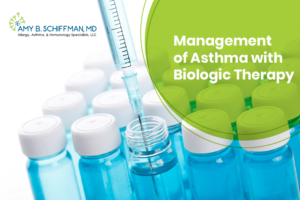Overview
Asthma is a chronic lung disease that is characterized by inflammation of the airways. Symptoms of asthma involve coughing, wheezing, and breathlessness. For most patients, it is treated by identifying and avoiding triggers, quick-relief inhalers, and daily inhaled or orally taken controller medications. But these types of medication or management may not be enough to treat and control moderate to severe cases of asthma.
According to the Asthma and Allergy Foundation of America (AAFA), 10 Americans die each day due to asthma. These deaths are avoidable and could have been prevented through proper treatment and care. Some cases also involved a severe case of asthma attack despite having a diagnosis of mild asthma. The newest class of treatment is termed biologic therapy and is highly effective in maintaining symptom-free days and minimizing exacerbations.
What is Biologic Therapy?
Biologic therapy refers to the treatment of asthma with prescription medications that work with your immune system. Biologics are pharmaceutical drugs that are made from the cells of living organisms and contain components that are derived from humans, animals, or microorganisms through biotechnology. They are genetically engineered proteins that are designed to target the substances that cause inflammation in the body such as antibodies, inflammatory molecules, and cell receptors. It disrupts the pathways that lead to the swelling of the lining which triggers asthma symptoms.
When Do You Need Biologic Therapy?
Biologic therapy is advised and prescribed to people with moderate to severe asthma, which means symptoms and allergic attacks despite common treatments and medication such as daily controller medications, inhaled corticosteroids, and short-acting beta-antagonist. The American Academy of Allergy Asthma and Immunology (AAAAI) states that biologics be prescribed to people with symptoms of poorly controlled asthma such as:
- Frequent coughing, wheezing, or shortness of breath
- Waking up at night with difficulty breathing
- Requiring a fast-acting reliever medication like albuterol several times a week
- Recurrent hospital admissions
- Recurrent emergency room visits
- Exacerbations requiring oral steroids more than twice a year
Biologics are prescribed as an add-on therapy to your regular asthma treatment plan.
What are the Benefits of Biologic Therapy?
According to a study from the US National Library of Medicine National Institutes of Health, biologics can significantly reduce asthma exacerbations and improve control of asthma. It helps in decreasing emergency room visits, hospitalizations, and the need for oral steroids due to an asthma attack. Not only do Biologics minimize short-acting controller use and dosage of corticosteroids, but also reduce missed school days and work. Biologic therapy can also improve the quality of life and potentially improve lung function for those who suffer from severe asthma.
Biologics Available for Asthma
Currently available biologics for asthma include omalizumab, mepolizumab, reslizumab, benralizumab, and dupilumab, with others still in development. Omalizumab primarily targets antibodies, immunoglobulin (IgE), that the immune system releases as a reaction to contact with an allergen. It is recommended for people with elevated IgE and a positive skin or blood test to an airborne allergen.
For the severe type of asthma called eosinophilic asthma, mepolizumab, reslizumab, or benralizumab is given. These biologics target interleukin-5 (IL5) which facilitate eosinophil production. Eosinophils are a sub-type of white blood cells that can trigger inflammation in the body, and especially the lungs. It is recommended for people with elevated blood eosinophil levels.
Dupiumab is a biologic that targets interleukins (IL-4 and IL-13) that promote allergic antibodies. It is recommended for people with allergic asthma, poorly controlled on standard medication.
Biologics therapy is administered by subcutaneous injection or rarely by intravenous infusion. After administering the biologics, the doctor will observe you for 30 minutes to 2 hours.
Side Effects of Biologic Therapy
Studies have shown that biologic medications are very safe. To address a small risk of anaphylaxis, you are observed for a period of time following your injection and prescribed anepinephrine autoinjector. There is also a small risk of parasitic infections with mepolizumab so the shingles vaccination is advised prior to starting therapy. Other possible side effects are soreness on the injected area, fatigue, headache, sore throat, muscle ache.
Bottomline
Talk to a trusted healthcare provider today to help you improve your asthma management care. Dr. Amy Schiffman, an asthma specialist in Boca Raton, Florida, will be more than happy to help you achieve a fuller, less symptomatic life with asthma.

